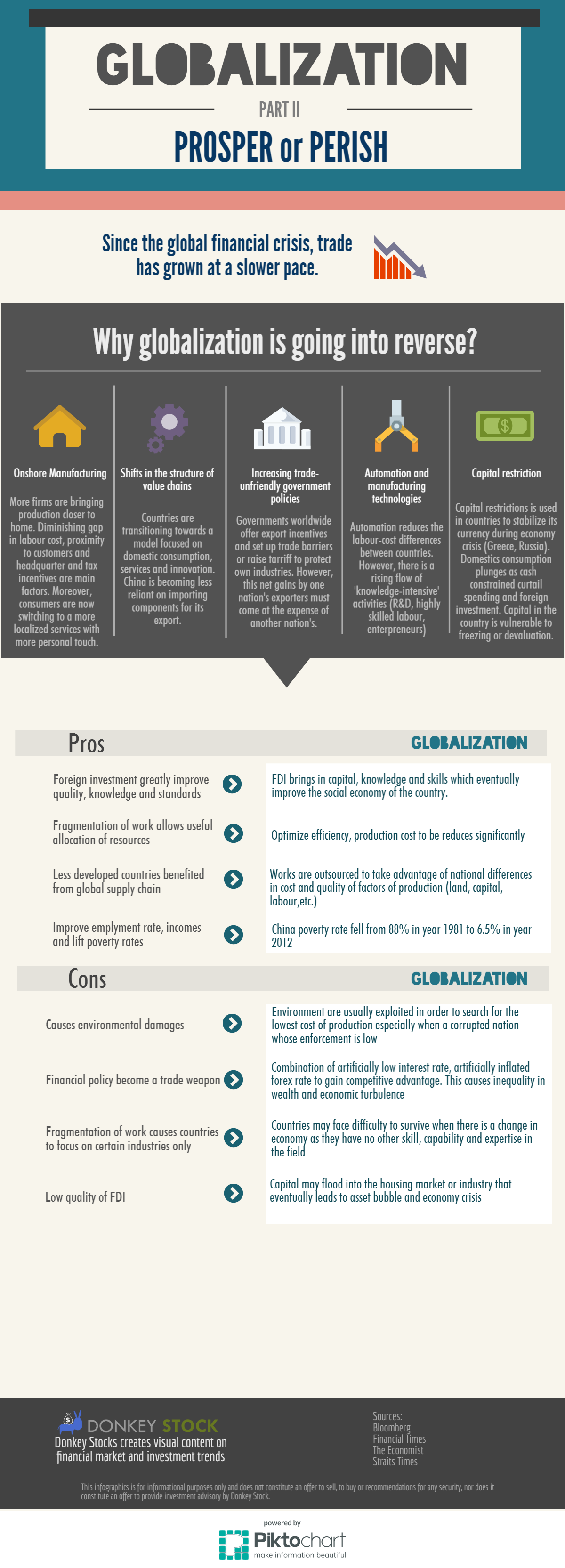Globalization: Prosper or Perish? - Donkey Stock
DonkeyStock
Publish date: Fri, 30 Sep 2016, 12:01 AM

Why globalization is going into reverse?
Onshore Manufacturing
More firms are bringing production closer to home. Trends of diminishing gap in labour cost, proximity to customers and headquarter and tax incentives are main factors. Moreover, consumers are now switching to a more localized services with more personal touch.
Shifts in the structure of value chain
Countries such as China are transitioning towards a model focused on domestic consumption, services and innovation. It is becoming less reliant on importing components for its export. China government is now focusing on sectors such as financial market, R&D, service sector, internet innovation.
Increasing trade-unfriendly government policies
Since the financial crisis, governments worldwide has done many interventions as an effort to boost up the economic. Export incentives and subsidies, trade barriers, higher tariff were implemented to protect own country industries. However, this net gains by one nation’s exporters must come at the expense of another nation’s.
Automation and manufacturing technologies
Automation reduces the labour-cost differences between countries. This is one of the reasons for firms to bring back production to home, as automation may cost less. However, there is a rising flow of ‘knowledge-intensive’ activities such as R&D, highly skilled labour, entrepreneurs.
Capital Restriction
Capital restrictions is used in countries to stabilize its currency during economy crisis (Greece, Russia). Domestics consumption plunges as cash constrained curtail spending and foreign investment. Capital in the country is vulnerable to freezing or devaluation.
Globalization good or bad?
Pros
Foreign investment greatly improve quality, knowledge and standards
FDI brings in capital, knowledge and skills which eventually improve social economy of the country.
Fragmentation of work allows useful allocation of resources
This optimize production efficiency as different fragments do their particular compartment before sending to assembly plant. Production cost is reduced significantly.
Less developed countries benefited from participating in global supply chain
Works are outsourced to take advantage of national differences in both cost and various factors of production (land, capital, labour etc.) Labour-intensive job is outsourced to low wages countries. Extra wealth generated by globalization has brought an increase in service sector employment.
Improve employment rate, incomes and lift poverty rate
Globalization bring more jobs to less developed countries. China, Vietnam, Cambodia, India are some of the countries benefited from it. China poverty rate fell from 88% in year 1981 to 6.5% in 2012.
Cons
Environmental damages
Environment are usually exploited in order to search for the lowest cost of production especially when a corrupted nation whose enforcement is low.
Financial policy become a trade weapon
Combination of artificially low interest rate, artificially inflated forex rate to gain competitive advantage in exporting. This causes inequality in wealth and economic turbulence.
Fragmentation of work causes countries to focus on certain industries only
Countries may face difficulty to survive when there is a change in consumer behavior, business environment as they have no developed other skill, capability and expertise in the field.
Low quality of FDI
Capital may flood into the housing market or industry that eventually leads to asset bubble and economy crisis
https://www.facebook.com/donkeystock/
More articles on Stock Infographics
Created by DonkeyStock | Jun 05, 2024
Created by DonkeyStock | May 28, 2024
Higher offer price for MPHB Capital Bhd ?
Created by DonkeyStock | May 27, 2024
DC Healthcare Bhd has delivered a worsening financial result
Created by DonkeyStock | Jan 04, 2024
Property investing by these visionary Singapore-based companies
Created by DonkeyStock | Jan 03, 2024
Discover the factors behind this surge, the challenges faced by top cocoa producers, and the ripple effect on chocolate manufacturers
Created by DonkeyStock | Aug 15, 2023
Created by DonkeyStock | May 03, 2023
Companies listed on Bursa Malaysia with an outstanding quarter results for the month of Apr 2023.


















